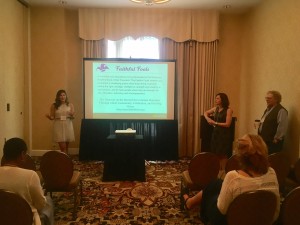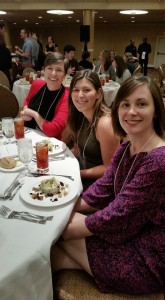By: Blake Gregor, Senior Communication Studies Major
At the University of San Francisco, students are taught to “change the world from here.” So how do students take what they learn in the classroom and apply it towards a positive change in the real world? For Kelsey Duff, a USF senior communication studies major, she has directed her qualitative research to bring awareness to underrepresented groups in the Bay Area. To expand her outreach and awareness, Kelsey participated in the International Association for Research in Service-Learning and Community Engagement Conference (IARSLCE). I sat down with Kelsey to discuss IARSLCE and the many USF experiences that led her there.
Q: What is the International Association for Research in Service-Learning and Community Engagement Conference?
Kelsey Duff: “IARSLCE is an international conference in which university faculty, graduate students and undergraduate students can present various works and research they have completed in regards to service learning and community engagement alongside their community partners. Research varies from quantitative studies, qualitative studies, ethnographic research and so on. The mission is to promote the development and dissemination of research on service-learning and community engagement internationally and across all levels of the education system. The objectives are to advance the fields of service-learning and community engagement research across the educational spectrum (primary, secondary, post-secondary, and further education).”
Q: What was your role within this conference?
Kelsey Duff: “My role was providing the undergraduate student service learner perspective to a multi-perspective group presentation with research conducted by Brandi Lawless.”
Q: How did you become involved with IARSLCE?
Kelsey Duff: “I became involved with this organization thanks to Brandi Lawless. I am Brandi’s research assistant and helped her collect data for her research with her community partner Faithful Fools. Because I also took Brandi’s Organizational Communication class, I actually did my service hours for the Fools. This ultimately led to a major reason why I was offered to attend the conference and present with Brandi and Sam Dennison, a volunteer at the Fools.”
Q: What type of research have you conducted that promoted a discussion about service-learning and community engagement?
Kelsey Duff: “The research I have conducted for this was through a qualitative lens. I have done some focus groups for Brandi, as well as transcribed and coded data alongside using thematic analysis. The research was primarily on the Fools’ Street Retreat, grass-routes approaches on service learning in which students actually don’t necessarily give or offer anything but rather are told to walk the streets of the Tenderloin and just observe the area.”
Q: Do you believe communication research is important, and, if so, why?
Kelsey Duff: “I absolutely believe communication research is important. If we do not have this research then how do we improve? Where else will we look to make changes in the world if we don’t critique the present communication? Also, researching communication enables us to develop a better understanding of different cultures, ideologies, backgrounds and histories.”
Q: Do you believe USF has prepared you to conduct research and properly use it as a tool for change, and, if so, how?
Kelsey Duff: “Absolutely! I was honestly so impressed with how well I knew the terminology being discussed. It got to the point where I was even asked if I was a professor! I would have to say; it’s honestly getting to the basics and having a strong qualitative studies class like I did with Brandi. The information she had taught me in just that one class has made my understanding of research much clearer and easier to practice to the point where certain parts of conducting research are just part of my second nature now. That single class and the research paper I composed not only led me to attend other conferences, but it also triggered my desire to become a professor one day.”
Q: What else would you like to share with me?
Kelsey Duff: “I think I’d love to share that overall the conference was good. But, man, oh man, is USF way more diverse than its colleagues who attended. The event was filled with primarily white people, and it just seemed they were touching the surface on critical pedagogy. I will say how honored I was to watch USF shine and present themselves to such a high standard.”


